Association"Hand on the heart" since 2011 has been helping the most socially and economically endangered citizens. The community is involved in their work daily because, thanks to donations from supporters, help reaches those who need it.
Volunteerism is one of the basic principles of the functioning of this organization, so in the last few years alone, more than 500 volunteers have contributed to its work.
Elma Adanalić, Enisa Tiro, Hana Hodžić, and Faris Gurda, members of the Board, told us what the daily activities of the association look like, what their greatest successes are, and how they improve the lives of their beneficiaries and bring a smile to the faces of many children.
How was your organization established? What changed from the beginning to this day?
Elma: I believe that every person has a gift and that this gift should contribute to the fulfillment of their purpose and mission. The idea for founding the association arose when I realized that my mission in this world is to help others, which is why I am exceptionally gifted with empathy. Together with my friends, who shared the same vision and desire to provide help and support to vulnerable categories of society, I started the Association "Hand on the Heart" now back in 2011. Our life paths have changed from then until today, but all of us who still share that same goal are still here because we believe that we are making the world a better place in small but sure steps.
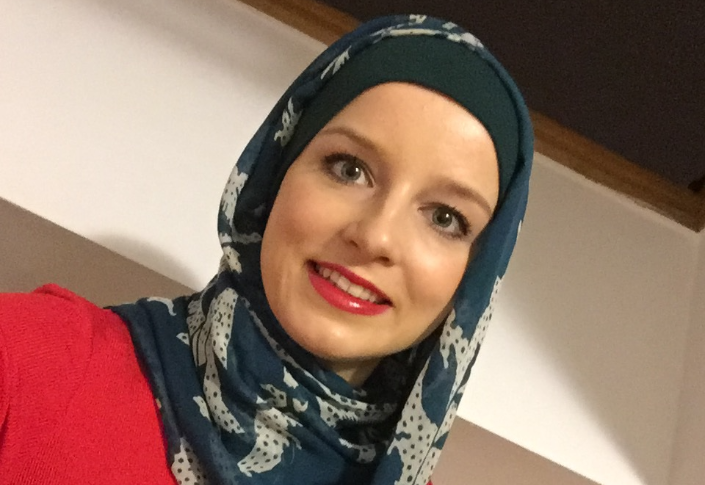
Elma Adanalić
What was your motivation for working in the non-profit sector?
Enisa: Back in high school, I was looking for an organization that I could get involved in and contribute to making someone's life easier. The fact that I have been in the Association "Hand on the Heart" for 11 years confirms that I managed to find what I wanted then. In addition, I received another gift, and that is lifelong friends.
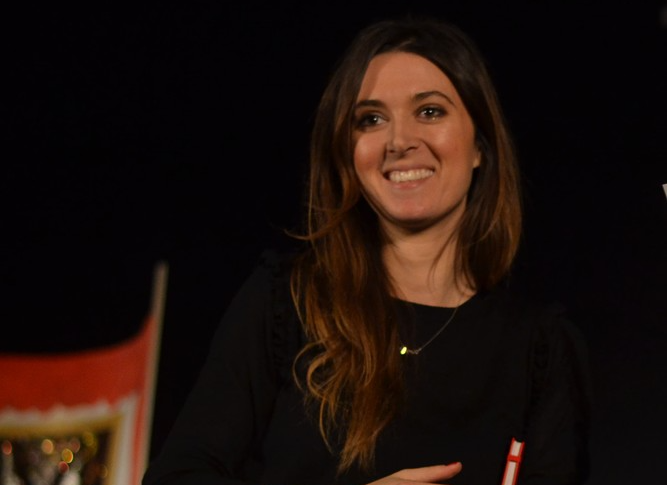
Enisa Tiro
Hana: First, I would say it is a child's smile, then personal progress through which we build ourselves in different ways. Through volunteering in various associations over the past five years, I have gained many skills that have helped me build myself. I always point out that the Association "Hand on the Heart" shaped me as a person uniquely, and I even managed to cope with one of my biggest challenges - how to successfully transfer knowledge to someone. The educational projects of the association gave me the opportunity and contributed to improving my skills in this regard by holding instructional classes in mathematics and related subjects, which are intended for children from low-income families.
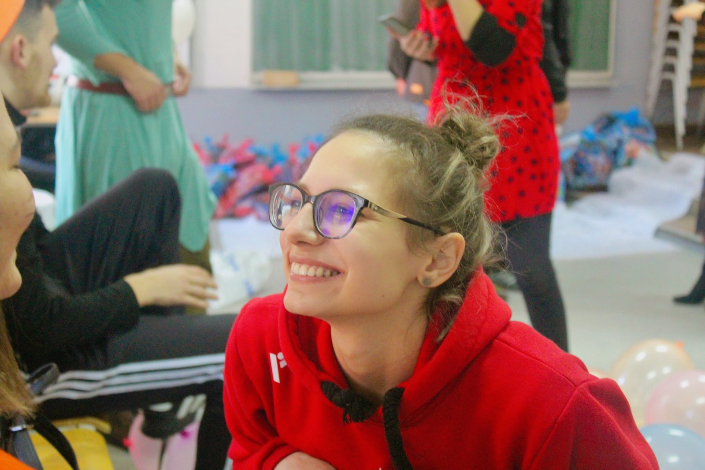
Hana Hodžić
Faris: In my first days of volunteering (in general), when I was a high school and college student, it seemed like another new activity through which I could fill time, meet new people, maybe acquire specific skills, and at the same time do something valuable and suitable for people around me. As a 30-year-old, the personal satisfaction I achieve after contributing to the realization of humanitarian and socially useful projects or mediation in delivering various types of assistance to our fellow citizens in need has become an invaluable and indispensable part of my life. Such a sense of self-fulfillment is challenging to achieve within conventional jobs, performing "normal" business activities.
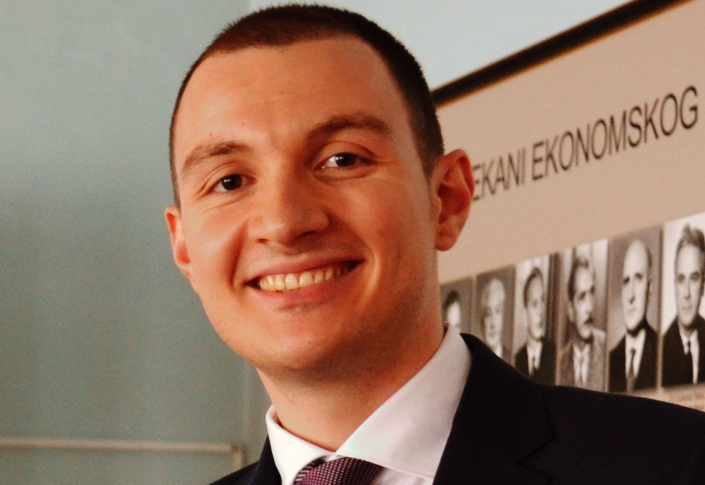
Faris Gurda
How did the COVID-19 crisis affect the organization's work? How much has the way you operate changed? What activities have you been most focused on in the past two years?
Has the pandemic also affected how the association is financed, has the form of financing and receiving donations changed, and in what way?
Enisa: Extremely many families were left without any income, and thus the number of applications for various types of assistance, which arrive at the address of the association almost every day, has increased a lot. In addition to the ongoing support we provide within our project "10 groceries", after a break (during the lockdown period), we continued to invite low-income families to the Center "Hand on the Heart," where every week I can choose to use, but preserved clothing and footwear.
Elma: The pandemic had many negative consequences for society, but we, as eternal enthusiasts, even managed to get something positive out of such a situation - opportunities for new projects and forms of humanitarian action. Foreign language courses for children from low-income families were transformed from a classroom, with 15 students at the time, into 18 online groups of conversational English and German language courses for children throughout Bosnia and Herzegovina. Nearly 200 children participate in the courses, and all courses are led by volunteers of the association residing in Bosnia and Herzegovina and at many addresses around the world.
Also, instead of equipping children with school supplies and backpacks, as we do every year, we organized a significant action of collecting computer equipment during the pandemic. Citizens and companies were once again up to the task. At our appeal, they donated new and used computer equipment, tablets, and laptops, which our team of volunteers tested. If necessary, they repaired and upgraded to enable them to work correctly. Thanks to all these efforts, we have helped dozens of elementary and high school students to follow online classes and our language courses and successfully fulfill their school obligations.
Faris: After the proclamation of the pandemic in Bosnia and Herzegovina, we put a significant focus on the collection of basic foodstuffs and hygiene items. Despite the great uncertainty and economic uncertainty that prevailed in those first months, the empathy of the citizens was still at a high level. Once again, it turned out that people show their best side in difficult times, and we had a pretty good response, both from individuals and local companies that supported us in various ways. The free delivery of packages with food and hygiene items to the addresses of families across the country proved to be one of the key types of intangible support provided to us by a domestic transport company at the time.
Considering that due to the whole situation, the critical challenge became how to enable citizens to support our work and projects in the easiest possible way, we introduced a novelty in the form of registration of the humanitarian number of the association. Thanks to this, everyone who wanted to become a part of our humane story in a period of limited movement could do so effortlessly and safely. This move proved to be a complete success and significantly helped realize the "10 Foods" project.
We continued the usual realization of all our permanent projects in the past year. However, the biggest change was felt in our most significant, and many will say the most beautiful project - "No children without packets. " As part of the above, our volunteers, in addition to preparing and distributing New Year's packages, every year directed and performed a New Year's play with many characters from fairy tales and designed creative workshops for the youngest. The final manifestation of the project previously, in one place, gathered up to 800 children from families of lower financial status. Unfortunately, due to all the restrictions that were in force, we have not been able to crown the project as we would like during the past two years. In 2020 and 2021, we focused only on the role of Santa Claus and the distribution of New Year's packages, which we realized in small groups over several weekends, which is why the process itself lasted a little longer than usual - until mid-January.
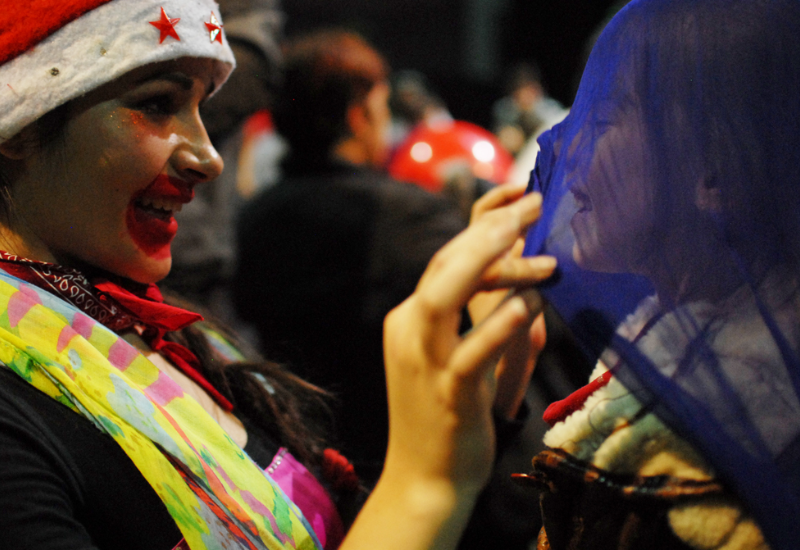
How is your organization funded? Which types of donors do you work with the most, and how? How can someone support your work?
Enisa: All donations we receive come from citizens, companies, and even from the volunteers of our Association. In addition to donating their time, our members often personally support the projects we implement with monetary donations. Also, the Association occasionally applies with its project proposals to public calls of local levels of government or companies. In addition, we strive to establish and maintain long-term cooperation with certain companies, associations, and sports teams. Through such types of support, we finance and enable the realization of our projects of educational and sports character (such as "Sports for a better life," "Youth and the transition from primary to secondary school," "Happy Mathematics," and prize competitions in mathematics and online foreign language courses).
Faris: The activities of the Association can be supported by various types of monetary, tangible, and intangible donations.
Cash donations can be paid to the transaction or foreign currency account of the Association (payment data are available at the link).
Material donations in preserved clothing, footwear, food items, hygiene items, school supplies, or toys for the youngest can be delivered every Saturday to our Center "Hand on the heart. " In addition, we are often contacted by donors who, e.g., want to provide scholarships to school-age children or a student from a family of lower financial status, donate furniture, etc. We resolve such inquiries by agreement and usually place ourselves as a mediator between donors and families registered in our database of beneficiaries of the Association.
Sometimes we "only" need space for packing, transport for children, transport of donations, or a hall to realize specific educational activities. Also, allowing children to visit the cinema and theater for free, which is a luxury for many of them, is just some of the types of intangible assistance that can greatly benefit us.
Since we have become recognized as the Association of trust, the amount of earmarked donations we receive for our regular projects and non-earmarked contributions for general activities is at the same level or slightly increasing every year. We believe that we achieve such continuity primarily thanks to a great team of sincere and dedicated young people from different circles of society, who are the image of our Association and, as such, represent us every day in the best possible way. Also, our very transparent way of working, which we maintain through friendly cooperation with the media and direct communication with the public through the Association's profile on all key social networks, certainly contributes to the sound image we have and carefully preserve.
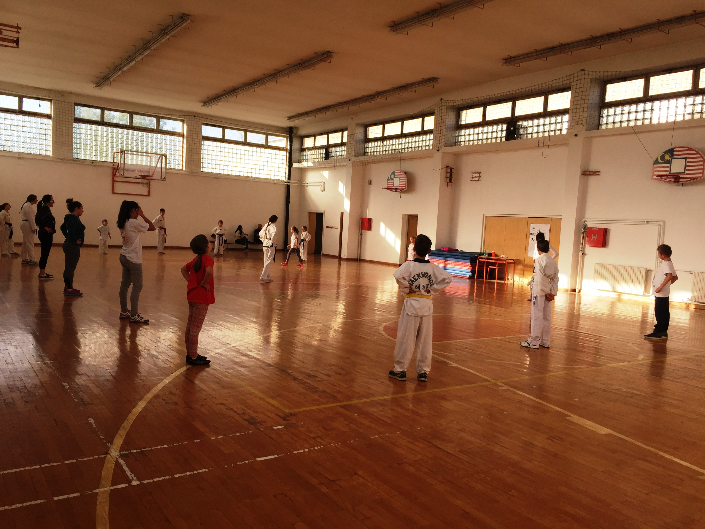
Which activities are you most focused on at this moment? What are the most important plans and goals that you plan to realize in the future?
Hana: The Association is currently focusing primarily on education and the inclusion of children from low-income families in sports activities. Since our inception, volunteers have continuously held instructional classes in all school subjects for children attending primary and secondary school. There are also already mentioned conversational courses in foreign languages (English and German). We also consider sports activities essential for the psycho-physical development of every child. With this in mind, in cooperation with many sports clubs from the Sarajevo Canton, we focused on giving children the opportunity to try and train for free various sports, such as athletics, taekwondo, swimming, and water polo, basketball, football, American football and volleyball.
Faris: We consider education to be the only way in which we can provide equal opportunities for children from low-income families to build a better future. Guided by this idea, for years, we have been trying to gradually shift the focus from one-time forms of assistance to activities that can achieve long-term positive effects. Guided by this idea, in the coming period, we plan to start some new projects in the field of education and sports and include as many children as possible and our volunteers in them. We believe that through such modules of action, which go beyond the humanitarian framework and encourage the development of skills and awareness of children, we will beautify and improve the quality of their daily lives.
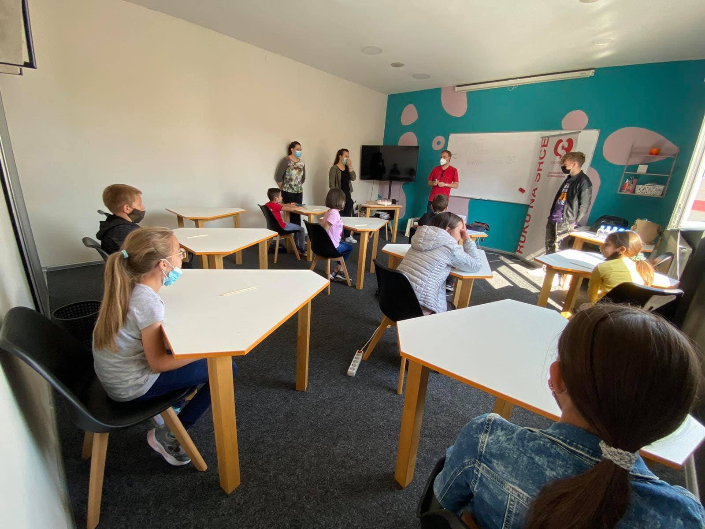
Do you involve the community in your work, in what ways, and what does it bring to you?
Enisa: We firmly believe that every change for the better starts locally, from ourselves. This is most visible in the period when we realize our project. "No children without packets." Then, in general, the response of citizens, as well as companies, is the highest. Many individuals often start collecting donations on their initiative in schools, colleges, sports clubs, or at work and significantly contribute to disseminating information about our projects. Sometimes donors even join us in packaging activities and come with colleagues and friends to help prepare New Year's packages for the youngest.
Faris: We strive to maintain open and direct communication with people in the local community. That is why we are always available for new ideas, proposals, and forms of cooperation. In recent years, we are often contacted on our initiative by companies that pay attention to socially responsible business. In addition to direct support, companies increasingly seek to involve their employees in certain humanitarian or socially beneficial activities. Indeed, we are happy to respond to such inquiries. Together with them, we try to find the best way to connect them, refer them or forward their help to various vulnerable categories of society.
Recently, many high school students have started to get involved in various projects of the Association. An important reason for that is undoubtedly the fact that many schools have introduced a particular mandatory fund of hours, which students need to spend volunteering during the year. We are certainly glad that students and school representatives recognize us as an address where they can do so, and the doors of the Association are always open. Our leadership is up to date in issuing the necessary certificates. Thanks to that, we get more and more young forces among our members, considering that some also express their desire for long-term volunteering in the Association.
Our fellow citizens directly participate in some special activities of the Association, such as actions of voluntary blood donation, which we implement in cooperation with the Institute of Transfusiology. Certainly, it is essential to mention the numerous sports clubs which independently responded to our public call and provided free training to children from families in our records.
A direct and open relationship with people from our community allows us to carry out our many ideas without hindrance. Although our volunteers are the ones who take over most of the work and responsibilities, the realization of specific goals would undoubtedly be much harder to achieve without various forms of support and active participation of our fellow citizens of all ages.
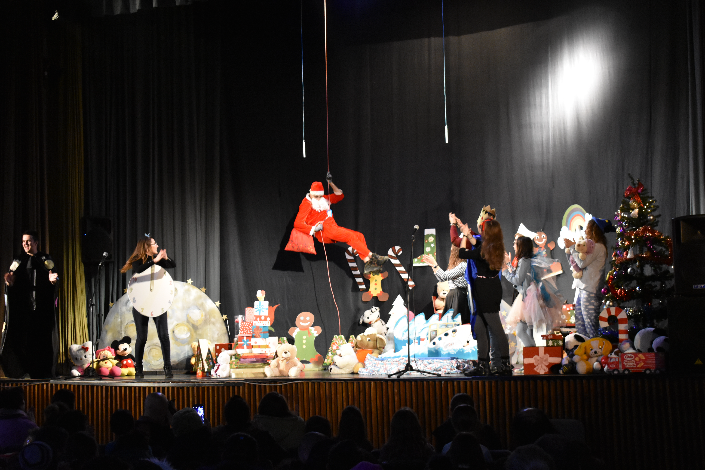
Your call for volunteers is constantly active. How do you reach out to volunteers, and how important are they for the activities of the Association? How much does volunteering contribute to the community? How does your Association contribute to raising awareness of the importance of volunteerism?
Enisa: "Hand on the Heart" is an exclusively voluntary association. Therefore, our complete action depends on the goodwill of all good people - our members, who act connected by a common desire to contribute to realizing a greater goal and make everyday life easier for people in need or someone completely unknown.
Hana: I learned about the Association "Hand on the Heart” through JobFAIR, organized by the student association EESTEC LC Sarajevo. After the mentioned job fair held at my faculty, I joined "Hand on the Heart." Volunteers usually find out about "Hand on Heart" through friends, colleagues, other student associations, or the media. Individual volunteering in various associations contributes a lot to the development of the whole community. If we focus on humanitarian volunteering, it allows people to develop empathy. Looking back at the entire situation with Covid-19, I think people have generally distanced themselves from each other and that this type of volunteering contributes to their reconnection and getting closer to people in the community.
Elma: From the very beginning until today, over 800 young people from Sarajevo, many other cities in Bosnia and Herzegovina, and even the wider region have volunteered in the "Hand on the Heart" Association. The best promotion of the Association itself is the projects and results we achieve in the local community. The positive stories we create together spread the positive spirit and energy in the community through a chain reaction. Our volunteers are the most incredible resource and strength of the Association, without which none of the imagined projects would be possible to realize.
Do you cooperate with other non-profit organizations, associations, and foundations, which and how?
Faris: Over the years, the Association has established numerous contacts with non-profit and non-governmental organizations from Bosnia and Herzegovina. We try to help specific associations through some of our projects, and we pass on New Year's packages, packages of school supplies, March 8 gifts, etc., to their protégés. Also, in coordination with other humanitarian associations and organizations, we occasionally strive to implement specific projects together or exchange information, ideas, experiences, and best practices. Indeed, when circumstances require it, due to our own limited capacities, we are free to ask our friends from other organizations for a particular type of support, such as, e.g., the distribution of New Year's packages in certain areas outside Sarajevo.
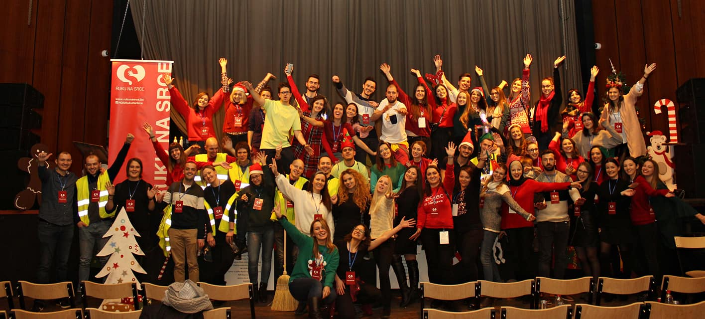
How does the Association "Hand on the Heart" contribute to the development of philanthropy in BiH?
Enisa: In our actions, we are always guided by the thought of how much our little can mean to someone. By raising the awareness of young people and reminding those a little older of what is really important, we draw attention to people in need and encourage the development of empathy towards vulnerable categories of society. Empathy is the main driver of action and what motivates young people to invest their free time and their own resources to help others.
Elma: In the children, we work with, we develop a desire and love to help and support others. During these 11 years of operation, certain children who were beneficiaries of the help of the Association "Hand on the Heart" today have even become our volunteers because now they want to give something back to their community.
Faris: We can say that the entire activities of the Association "Hand on Heart" are philanthropic. Every effort, activity, and project of ours is aimed at helping people who are in a difficult financial and often life situation. Initially, this care for others was mostly reflected in providing some basic, one-time types of help. However, thanks to the maturation of the volunteers who have been part of this story for 10-11 years and new members and the energy and ideas they brought with them, the Association itself has evolved as a living organism. Thus, over time, we have come up with a concept of action based on long-term empowerment of the potential of our fellow citizens of all ages. This reflects the various projects on which we have been placing increasing emphasis over the last 4-5 years. These are projects that contribute to improving the quality of people's lives,
I think we can freely say that our volunteers are true philanthropists who daily advocate and promote the care of others in the society of Bosnia and Herzegovina. Such behavior does not go unnoticed and encourages others to think and act in the same direction. Confirmation is numerous successfully realized activities with representatives of various companies, sports clubs, schools, faculties, etc. In support of the above, I would like to add the more frequent spontaneous reports of our fellow citizens of different ages who learned about the activities of the Association and are available to contribute to our humanitarian goals. Sometimes these people become our volunteers, but sometimes they "just" remain in the role of friends of the Association, who often take on the part of the "burden" that we carry when we need it most.
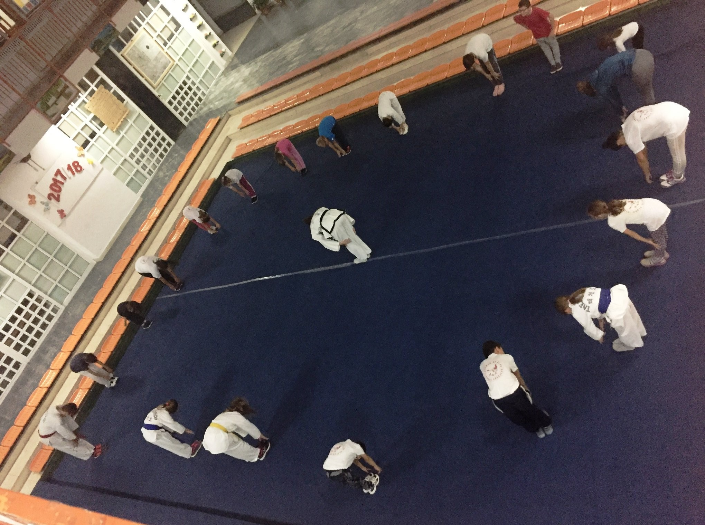
What are the biggest challenges you face in your work?
Hana: Many families cannot afford their children a New Year's package and, in many cases, a decent meal, and I think the biggest challenge is how to provide all families with the help they need. It is difficult when, with limited resources, you have to decide how you will help a family.
Elma: Motivation of volunteers to remain consistent in supporting a particular project until the very end of its implementation, despite the constant lack of free time we all face today.
Faris: What is most difficult for all volunteers who are in direct communication with families of lower financial status is the inability to assist all those who contact us with such requests. Unfortunately, with each published public call for a specific project primarily intended for donors, the Association receives a huge number of requests for assistance. Material forms of help are always limited, so it is impossible to meet everyone's needs. Therefore, our valuable team that keeps records of families from our database and their needs strives to please a different group of people within each project so that during the year, everyone receives a certain type of support and an equal amount of direct assistance.
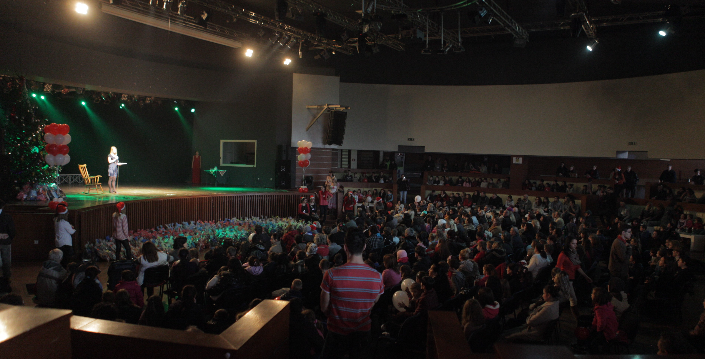
What are the biggest successes that the Association has achieved in its work so far, and what do you still want to achieve?
Faris: Among the greatest successes, we would undoubtedly count the continuity of the Association's activities during these 11 years. Then, there are as many as 3,000 New Year's packages prepared and distributed in 2019 throughout Bosnia and Herzegovina. We are also incredibly proud of our current project of online conversation courses in foreign languages, in which 120 children from 8 cities in Bosnia and Herzegovina are currently participating in 18 working groups.
In the future, we want to raise the level of our activities to a new level in terms of providing stable sources of funding that will enable the continuous implementation of particular projects. Raising awareness in the local community about the importance of volunteering and providing assistance to those who need it the most we consider a continuous process, which we will certainly continue to deal with in the coming period. Finally, we would like to rejuvenate our team, given that a significant number of current members, who have been here since the very beginning of the Association, are now in their thirties. Although age itself is not an obstacle to volunteering, an increasing number of business and private commitments are reflected in the lack of free time available to work in the Association.
We would conclude this interview with our unofficial slogan, a kind of guiding idea of our volunteers all these years: "We know we can't change the world, but sometimes a little is enough to make someone's world more beautiful."
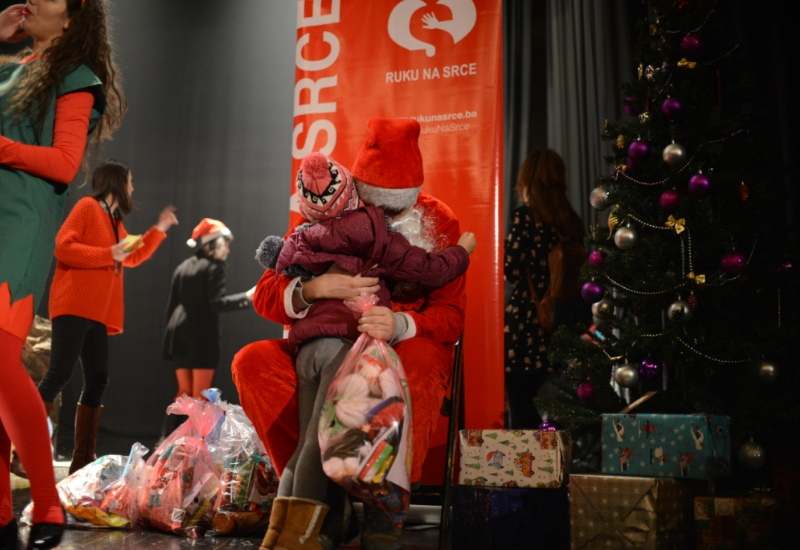
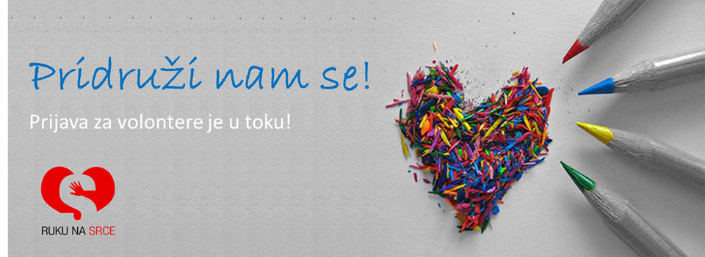

Leave a comment